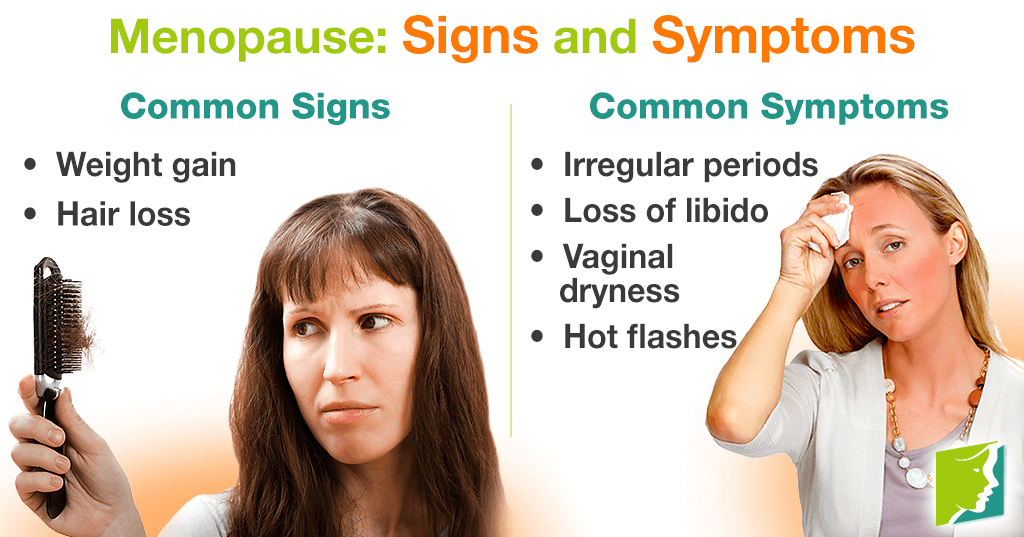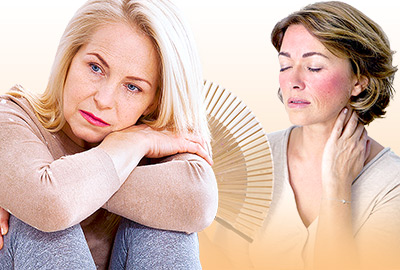Much like puberty, menopause is a natural stage in life. It usually occurs in a woman's forties and fifties, though it can occur earlier or later.
Menopause has a number of signs and symptoms associated with it. Not all women will have all these signs or symptoms, and not to the same degree. It's important to know what to expect when you reach this stage in life.
Difference between a Sign and a Symptom
Signs and symptoms are distinct phenomena that sometimes get blurred, even in the medical community.
Signs can be measured quantitatively. For example, if you put on weight, then you can measure your weight gain on a scale.
Symptoms cannot be measured except by the one who is experiencing them. For example, pain is a symptom, because the person experiencing it is the only one who can understand how severe it is.
Common Signs of Menopause
Here are some of the quantifiable signs of menopause:
Weight gain
Changes in your body that happen during menopause mean that it becomes easier for your body to gain weight, especially around the waist and stomach.
Hair thinning and loss
A woman's hair can lose its thickness and volume as hair begins to thin and fall out.
High levels of follicle-stimulating hormone (FSH)
Your doctor can do a blood test to measure your FSH levels. Higher levels can indicate menopause.
The early stages of menopause have similar signs to several other conditions as well, such as polycystic ovarian syndrome (PCOS) or thyroid disorders. You may want to consider having your doctor test your thyroid stimulating hormone (TSH) levels to rule that possibility out.
Common Symptoms of Menopause
Hormonal imbalances during menopause can lead to any combination of the following symptoms:
Hot flashes
The most common symptom of menopause that affects the majority of women.
Night sweats
Your body sweats to cool itself off after a hot flash that occurs while sleeping.
Irregular periods
As your body transitions through menopause, periods become irregular, sometimes coming months apart and with no warning.
Vaginal irritation
Changing hormones can lead to vaginal dryness, which can make sex uncomfortable and painful.
Loss of libido
This is caused by a variety of reasons, and is often exacerbated by problems with vaginal dryness and discomfort.
Fatigue
A woman may become tired more easily and need to take more breaks to rest.
Mood swings
Fluctuating hormones can sometimes cause mood swings, similar to when a woman is menstruating.
Remember that not all women experience all of these symptoms, nor do they experience them to the same degree.
More Information on Menopause Signs and Symptoms
There are several ways to alleviate or reduce the signs and symptoms of menopause, such as:
- Eating healthy
- Regular exercise
- Group support
- Alternative medicines, such as herbal remedies
Learn more about how to alleviate signs and symptoms of menopause.
Sources
- Ehrlich, S.D. (2014). Menopause. Retrieved May 14, 2015, from http://umm.edu/health/medical/altmed/condition/menopause
- Grindler, N., Allsworth, J., Macones, G., Kannan, K., Roehl, K. (2015). Persistent Organic Pollutants and Early Menopause in U.S. Women. Public Library of Science ONE, 10(1), e0116057. Retrieved from http://journals.plos.org/plosone/article?id=10.1371/journal.pone.0116057
- Office on Women's Health. (2010). Menopause. Retrieved May 14, 2015, from http://womenshealth.gov/menopause/early-premature-menopause/




